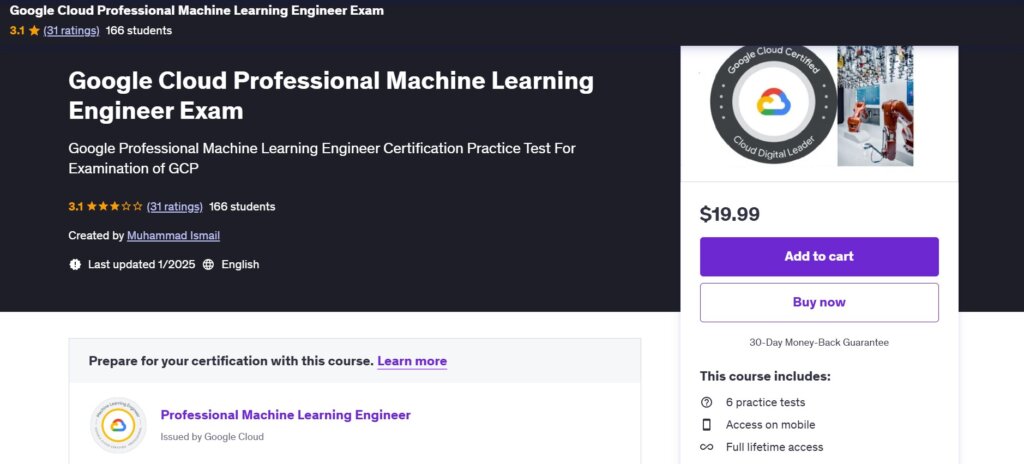Best Online Learning Platforms for Computer Science
Best Online Learning Platforms for Computer Science In today’s digital era, learning computer science has never been easier. Whether you’re a beginner or an experienced professional looking to upskill, online learning platforms provide a flexible and affordable way to gain knowledge. Here are some of the best online platforms for studying computer science in 2024, Best Online Learning Platforms for Computer Science.
1. Coursera
Best for: University-level courses and professional certificates
Coursera partners with top universities like Stanford, MIT, and Harvard to offer high-quality courses, specializations, and degree programs. Many courses are free to audit, while certificates and degrees come at a cost.

Notable Courses:
- Machine Learning by Muhammad Ismail Udemy Instructor
- Python for Everybody by University of Michigan
- Computer Science: Programming with a Purpose by Princeton University
2. Udemy
Best for: Affordable, self-paced learning
Udemy offers thousands of computer science courses at relatively low prices, Best Online Learning Platforms for Computer Science often with lifetime access. Courses range from beginner programming to advanced topics like machine learning, cloud computing, and cybersecurity.
Notable Courses Best Online Learning Platforms for Computer Science
- The Complete JavaScript Course: From Zero to Expert!
- Python Bootcamp: Go from Zero to Hero
- Mastering Data Structures and Algorithms

3. edX
Best for: University-accredited courses and micro-degrees
Like Coursera, edX collaborates with prestigious universities and institutions to provide high-quality courses. You can find free courses, professional certificates, and full degrees in computer science.
Notable Courses:
- CS50x: Introduction to Computer Science by Harvard University
- Best Online Learning Platforms for Computer Science
- Introduction to Python Programming by Georgia Tech
- Data Science MicroMasters by UC San Diego
4. Pluralsight
Best for: Software development and IT professionals
Pluralsight focuses on software development, desktop Support Computer basic Course cloud computing, and cybersecurity, offering paths tailored to IT professionals. Best Online Learning Platforms for Computer Science The platform provides skill assessments and hands-on labs for a more interactive learning experience.
Notable Courses:
- Python Fundamentals
- Ethical Hacking and Cybersecurity Basics
- Best Online Learning Platforms for Computer Science
- AWS Certified Solutions Architect
5. Codecademy
Best for: Interactive coding exercises
Codecademy is ideal for beginners who prefer hands-on learning. The platform offers interactive coding environments that allow users to practice coding directly in their browser.
Notable Courses:
- Learn Python 3
- Full-Stack Engineer Career Path
- JavaScript and Web Development Fundamentals
6. Khan Academy
Best for: Free computer science fundamentals
Khan Academy provides free, Best Online Learning Platforms for Computer Science high-quality lessons on computer science and programming, making it a great starting point for beginners.
Notable Courses:
- Computer Science: Algorithms and Data Structures
- Intro to JavaScript and Web Development
- Best Online Learning Platforms for Computer Science
- Cryptography Basics
7. MIT OpenCourseWare
Best for: Free, university-level computer science courses
MIT OCW provides free access to MIT’s computer science curriculum, including lecture notes, assignments, and exams.
Notable Courses:
- Introduction to Computer Science and Programming in Python
- Artificial Intelligence
- Software Construction
8. Udacity
Best for: Career-focused nano degree programs
Udacity offers industry-relevant nanodegree programs, developed in collaboration with top tech companies like Google, Amazon, and IBM. While expensive, these programs often include career services like resume reviews and job placement assistance and Best Online Learning Platforms for Computer Science.
Notable Courses:
- Data Structures and Algorithms
- AI for Business Leaders
- Cloud DevOps Engineer Nanodegree
Best Online Learning Platforms: Academy of Computer Science
today’s digital world, acquiring computer science knowledge is easier than ever. Various online learning platforms provide high-quality education, making it possible for students and professionals to enhance their skills at their own pace. This article highlights the best online learning platforms
University-accredited courses and professional certificates
Coursera partners with top universities and organizations to offer world-class courses. Many of its computer science courses come from institutions like Stanford, MIT, and Harvard.
for the Academy of Computer Science, helping you choose the right platform for your learning journey we talk about best online course learn and grow help you about .and Academy of Computer Science.
Curriculum Model: Problem-Based Learning with Mastery Focus in Computer Science
In the evolving landscape of computer science education, traditional lecture-based learning is gradually being replaced with more engaging, hands-on approaches. One such method gaining widespread recognition is Problem-Based Learning (PBL) combined with a Mastery Learning focus. This curriculum model not only enhances critical thinking but also ensures that students Best Online Learning Platforms for Computer Science develop deep, long-lasting expertise in the subject. In this article, we explore the significance of this curriculum model, its implementation, and its benefits in computer science education.
Understanding Problem-Based Learning (PBL)
Problem-Based Learning is an educational approach where students learn through the experience of solving open-ended, real-world problems. Best Online Learning Platforms for Computer Science Instead of passively consuming information, students actively engage in problem-solving, fostering analytical and research skills crucial for computer science.
Key Characteristics of PBL:
- Real-World Relevance: Problems are designed to reflect real-world applications, preparing students for industry challenges.
- Student-Centered Learning: Learners take charge of their education, working collaboratively in teams.
- Instructor as a Facilitator: Teachers guide rather than directly instruct, promoting independent learning.
- Interdisciplinary Integration: Encourages connections across different computer science domains, such as software engineering, data science, and cybersecurity.
Mastery Learning: Ensuring Deep Understanding
Mastery Learning is a complementary methodology where students progress through a curriculum at their own pace, ensuring a solid grasp of fundamental concepts before moving on to more advanced topics. This approach is particularly effective in computer science, whBest Online Learning Platforms for Computer Science ere foundational skills like programming logic, algorithms, and data structures must be well understood before tackling complex projects.
Principles of Mastery Learning:
- Competency-Based Progression: Students advance only after demonstrating mastery of a concept.
- Frequent Formative Assessments: Continuous assessments help identify learning gaps.
- Best Online Learning Platforms for Computer Science
- Personalized Learning Paths: Tailored instruction to meet individual learning needs.
- Iterative Learning Process: Encourages practice and refinement until proficiency is achieved.
Implementing a Problem-Based Learning and Mastery Curriculum in Computer Science
To design an effective curriculum integrating both PBL and Mastery Learning, educators must consider several critical components.
1. Defining Clear Learning Outcomes
Before designing courses, clear and measurable learning outcomes should be established. These outcomes should align with industry standards and academic expectations. Example objectives include:
- Develop proficiency in programming languages such as Python, Java, or C++.
- Apply algorithms and data structures effectively in problem-solving.
- Best Online Learning Platforms for Computer Science
- Understand system design and software engineering principles.
2. Structuring Problem-Based Modules
Each course module should center around a real-world problem, guiding students through a structured problem-solving process.
Example Module Structure:
- Problem Introduction: Present a challenging real-world scenario.
- Investigation Phase: Students research and explore possible solutions.
- Solution Development: Teams design and implement solutions.
- Evaluation and Reflection: Students review outcomes, refine approaches, and iterate improvements.
3. Leveraging Technology and Online Tools
With the advancement of educational technology, various tools can be used to support PBL and Mastery Learning in computer science:
- Online Coding Platforms: CodeSignal, LeetCode, HackerRank
- Version Control Systems: GitHub, GitLab
- Collaborative Tools: Google Colab, Jupyter Notebooks
- Learning Management Systems (LMS): Moodle, Canvas, Blackboard
4. Assessments and Feedback Mechanisms
Assessment plays a crucial role in mastery-focused learning. Implementing frequent formative assessments helps track student progress and identify areas needing reinforcement.
Effective Assessment Strategies:
- Project-Based Evaluations: Assessing problem-solving abilities through real-world projects.
- Peer Reviews: Encouraging collaborative learning and feedback.
- Automated Coding Tests: Instant feedback on programming exercises.
- Self-Reflection Reports: Promoting metacognitive skills by having students evaluate their learning process.
5. Encouraging Collaboration and Teamwork
Team-based learning is an essential aspect of PBL, mirroring the collaborative nature of software development. Encouraging students to work in teams fosters communication, leadership, and problem-solving skills.
Benefits of a Problem-Based and Mastery-Focused Curriculum in Computer Science
1. Enhanced Problem-Solving Skills
By focusing on real-world challenges, students develop the ability to analyze complex problems and devise effective solutions—an essential skill in software development and data science.
2. Deeper Conceptual Understanding
Mastery Learning ensures that students have a thorough grasp of fundamental topics before progressing, reducing knowledge gaps and improving retention.
3. Increased Student Engagement
Active learning methods keep students motivated, making learning more enjoyable and less monotonous compared to traditional lecture-based instruction.
4. Industry Readiness
Students graduate with practical experience and problem-solving skills that are directly applicable to the tech industry, improving their employability.
5. Greater Retention and Application of Knowledge
Because students apply concepts in practical settings, they retain information better and are more adept at using their knowledge in real-world situations.
Challenges and How to Overcome Them
1. Time-Intensive Preparation
Developing problem-based learning modules and mastery-based assessments requires substantial effort. Educators can address this by using existing open-source resources and collaborating with peers.
2. Resistance to New Teaching Methods
Students and faculty accustomed to traditional teaching methods may initially resist the shift. Providing orientation sessions and gradually integrating PBL elements can ease the transition.
3. Assessment Complexity
Evaluating problem-solving skills effectively can be challenging. A mix of qualitative and quantitative assessment methods, such as peer reviews, project-based assessments, and automated testing, can provide balanced evaluation.
Conclusion
A curriculum model integrating Problem-Based Learning and Mastery Learning offers a transformative approach to computer science education. By emphasizing real-world problem-solving and ensuring comprehensive mastery of foundational concepts, this approach prepares students for successful careers in the tech industry. While challenges exist, the benefits far outweigh the difficulties, making this an ideal methodology for modern computer science education.
As the demand for skilled computer scientists grows, adopting innovative teaching models like PBL with a mastery focus will be key to producing competent, industry-ready graduates. Educators, institutions, and learners must collaborate to implement these strategies and revolutionize the way computer science is taught.

